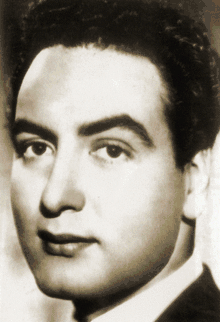Kassaman
"Kassaman"[1][2] or "Qassaman"[3] (Arabic: قَسَمًا, "we pledge";[1][2] Berber languages: Tagallit, "the oath" or "we swear"[3]) is the national anthem of Algeria. Moufdi Zakaria authored the lyrics, while the music was composed by Egyptian composer Mohamed Fawzi. The song was adopted as the national anthem in 1962, when the country gained independence from France.
| English: We Pledge | |
|---|---|
| قَسَمًا (Arabic) / Tagallit (Berber) | |
 | |
National anthem of | |
| Also known as | "Qassaman" (English: "We Pledge") |
| Lyrics | Moufdi Zakaria, 1955 |
| Music | Mohamed Fawzi |
| Adopted | 1962 |
| Preceded by | "La Marseillaise" |
| Audio sample | |
"Kassaman" (instrumental)
| |
History
_cropped.jpg)

The French invaded Ottoman Algeria in 1830 and made it an integral part of Metropolitan France within its colonial empire.[4] For the next century, the native population were given very few political rights.[5] Consequently, a nationalist movement began in the 1920s and gained traction after World War II,[6] when a commitment by the government to grant French Algeria autonomy failed to materialize.[7] A prominent member of this movement was Moufdi Zakaria,[8] a Mozabite Berber[9][10] poet affiliated with the Algerian People's Party (PPA).[11] He was jailed and tortured on several occasions between the 1920s and 1962.[8] It was during one of these experiences, in April 1955,[12][13] that he penned the words to "Kassaman".[1][2] Since he did not have access to paper or writing instruments while incarcerated in Barberousse Prison,[12] Zakaria reportedly wrote the lyrics with his own blood on the walls of his jail cell.[12][14][15] The musical portion of the anthem was subsequently composed by Mohamed Fawzi,[2] who was asked to undertake this effort after two earlier submissions by other composers – one of which was by Mohamed Triki – were rejected.[12]
Both the lyrics and music were officially adopted in 1962;[1][2] in that same year the Évian Accords were signed paving the way for a referendum in which Algerians overwhelmingly voted in favour of independence, which was duly granted.[4] Although "Kassaman" was only intended to be a provisional national anthem, it has endured to this day.[16]
Context of lyrics
The lyrics of "Kassaman" are reflective of a war song. This is because it promotes nationalistic ideals and principles on the front line, glorifies the actions of the National Liberation Front (FLN), as well as espousing armed uprising and how it is the sole route to attaining independence.[16] It is also noteworthy in that it alludes to another country – France – specifically concerning the violent struggle against them for independence. The song foreshadows how "the day of reckoning" will befall Algeria's former colonial ruler.
Legal protection
Even though "Kassaman" was adopted in 1962, it was not until November 2008 that an amendment to Article 5 of the Constitution of Algeria was made declaring it as "immutable", given its association with the country's revolution.[16] It also confirmed that the national anthem comprises all of the song's verses, thus ending the deliberation over whether it was still appropriate to include the unfavourable reference to France in the present day.[16]
Lyrics
Arabic lyrics |
Arabic (Latin) transliteration |
English translation |
١ |
I |
I |
References
- "Algeria". The World Factbook. CIA. 8 May 2017. Retrieved 30 May 2017.
- DiPiazza, Francesca Davis (1 January 2007). Algeria in Pictures. Twenty-First Century Books. p. 69. Retrieved 29 May 2017.
- Hadjab, Warda (2016). "Algiers–Paris Round Trips: Diasporic Pathways of a Public Civil Dissidence". Journal of Immigrant & Refugee Studies. 14 (3): 322. doi:10.1080/15562948.2016.1208315. (registration required)
- Brown, L. Carl; Zaimeche, Salah (21 April 2017). "Algeria – History". Encyclopedia Britannica. Encyclopedia Britannica, Inc. Retrieved 30 May 2017.
- "Algeria – History". Worldmark Encyclopedia of Nations (12th ed.). Thomson Gale. 2007. Retrieved 30 May 2017.
- McDougall, James (2007). "Algeria". In Benjamin, Thomas (ed.). Encyclopedia of Western Colonialism since 1450 (1st ed.). Macmillan Publishers USA. Retrieved 30 May 2017.
- "Algerian War". Encyclopedia Britannica. Encyclopedia Britannica, Inc. Retrieved 30 May 2017.
- Africa since 1914: a historical bibliography. ABC-CLIO Information Services. 1985. p. 66. Retrieved 30 May 2017.
- Marks, Jon (14 December 2015). "Chapter 4: Opposing aspects of colonial rule in this century to 1930: the unusual case of the Beni Mzab". In Joffé, George (ed.). North Africa: Nation, State, and Region. Routledge. p. 68. Retrieved 30 May 2017.
- Proglio, Gabriele, ed. (7 March 2017). Decolonising the Mediterranean: European Colonial Heritages in North Africa and the Middle East. Cambridge Scholars Publishing. p. 70. Retrieved 30 May 2017.
- Aissaoui, Rabah (30 March 2009). Immigration and National Identity: North African Political Movements in Colonial and Postcolonial France. I.B. Tauris. p. 31. Retrieved 30 May 2017.
- ""Kassaman," Anthem to the Glory of Algerian Revolution". Algiers. Algeria Press Service. 5 July 2012. Archived from the original on 21 January 2018. Retrieved 30 May 2017. (registration required)
- Naylor, Phillip C. (7 May 2015). Historical Dictionary of Algeria. Rowman & Littlefield. p. 553. Retrieved 30 May 2017.
- Marshall, Alex (28 August 2015). "Alex Marshall: Flower of Scotland nation's choice". The Scotsman. Edinburgh. Archived from the original on 30 May 2017. Retrieved 30 May 2017.
- Burnton, Simon (9 June 2014). "Every 2014 World Cup national anthem reviewed by a pop star!". The Guardian. London. Retrieved 30 May 2017.
- Branche, Raphaëlle (2011). "The martyr's torch: memory and power in Algeria". The Journal of North African Studies. 16 (3): 432, 441. doi:10.1080/13629387.2010.550138. (registration required)
External links
| Wikisource has original text related to this article: |
| Wikimedia Commons has media related to National anthems of Algeria. |
- Streaming Audio, Lyrics and Info
- Lyrics in Arabic at the Library of Congress Web Archives (archived 2005-12-06)
- The Musical Score, with Text in Arabic and French, on the Presidency's Website
- The Algerian Anthem, with Arabic Lyrics and War Pictures
- The People's National Army's Republican Guards Singing the Algerian Anthem